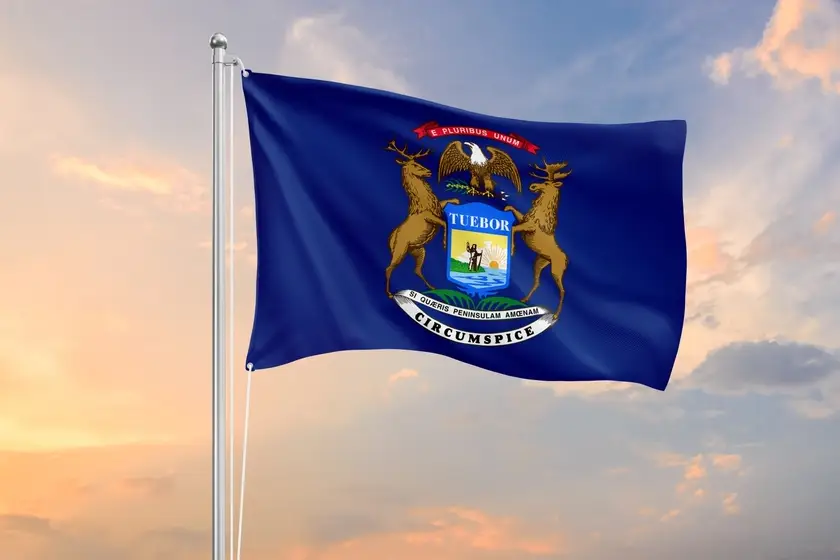Michigan is the latest state to warn licensed gaming operators against offering sports prediction markets. The Michigan Gaming Control Board sent a letter to all state licensees saying that any involvement in offering “sporting event contracts” could have “implications relative to your licensure in Michigan.”
The MGCB memo, sent by executive director Henry Williams, was first shared by gaming lawyer Daniel Wallach on X.
BREAKING: Michigan Gaming Control Board warns licensed gaming operators that any involvement in the offering of sports-event contracts “will have implications relative to your licensure in Michigan.” pic.twitter.com/Z5EbnvcMtt
— Daniel Wallach (@WALLACHLEGAL) October 3, 2025
Michigan’s warning follows similar letters sent by gaming regulators in Ohio and Arizona. The MGCB’s letter comes as daily fantasy sports operators Underdog and PrizePicks have made moves towards offering prediction markets. Leading online sports betting platform FanDuel also announced a partnership with the CME Group to offer non-sports market trading related to finance and economics.
Board says sports markets not “in accordance with state gaming laws”
The MGCB letter was addressed to the state’s licensed sports betting, fantasy contest and online casino operators, as well as their suppliers and commercial casinos. The letter states that the Board is aware that some licensees “may be considering opportunities to operate, offer, or facilitate access to prediction markets,” and specifically mentions the potential to facilitate trading sports event contracts.
The MGCB notes that sports prediction markets “would not operate in accordance with state gaming laws” and says that “any involvement” with those markets could lead to a reassessment of their licensing status.
The letter cites various gaming statutes that task the MGCB with “developing licensing qualifications, standards, and procedures and evaluating a person’s suitability for licensure.” Citing statute MCL 432.204(14)(a), the Board said that it’s the license holder’s responsibility to maintain its “suitability” for the license, including as related to the entity’s “character, reputation, integrity,” and “business probity.”
The letter further states that action could be taken if the licensee is involved, directly or indirectly, with offering or facilitating access to sporting event contracts in Michigan or any other jurisdiction in which a governmental authority has “expressly objected to or acted in any way to prevent or cease the offering of sporting event contracts in such jurisdiction.”
Michigan previously contacted CFTC with sports market concerns
The letter concludes by telling licensees they must alert the MGCB ahead of time if they are intending to offer sports prediction markets in Michigan:
“The MGCB expects any licensee that is actively pursuing any involvement in the offering of sporting event contracts will provide prompt notice to the MGCB.”
The MGCB’s letter to licensees is the state’s latest move to counter sports event contracts, which it sees as illegal sports betting. On April 11, the Board announced a (still ongoing) investigation into “unlicensed sports prediction markets,” and later in April, it submitted its concerns in a letter to the Commodity Futures Trading Commission (CFTC), the federal agency that approves and oversees prediction market platforms.
“The offering of sporting event contracts by CFTC-regulated entities, without adherence to Michigan’s licensing requirements and in a manner that may not meet prescribed consumer protections, exposes Michigan residents to unnecessary risk and undermines public trust,” Williams said when the CFTC letter was sent. “We are particularly concerned that such contracts are being promoted as investment opportunities, a message that directly contradicts Michigan’s responsible gaming principles.”
Sports betting operators have been careful with prediction market talk
Michigan’s letter appears to be a direct warning that if any operator pursues entry into the sports prediction market space, they could risk losing access to the state entirely. That could mean big revenue losses for online gaming giants FanDuel and DraftKings, who both have licenses to operate their iCasino, DFS and sportsbook products in the state.
The possibility of damage to its main properties is a big reason why major online sports betting companies have generally been coy when discussing the possibility of getting into prediction markets, with most saying they are monitoring developments in the space. During an August earnings call, DraftKings CEO Jason Robins explicitly mentioned having to be careful about any potential prediction market pursuits due to the company’s crucial regulatory relationships.
“We’re evaluating,” Robins said when asked about prediction market opportunities. “Obviously we have a lot of stakeholders, state regulators, relationships with tribes, others that we want to make sure we consider as we think about what our different options are. We’re keeping a close eye on it and figuring out what we want to do.”
States trying to slow down explosive growth of sports prediction markets
Michigan’s warning to gaming operators and suppliers comes at an eventful time for prediction markets and their ability to offer sports event contracts in all 50 states. Platforms like Kalshi and Robinhood have experienced blockbuster trading volume primarily driven by sports markets.
But there have been a litany of state and tribal legal challenges related to the right of those platforms (and others) to offer sports event contracts in jurisdictions that see them as illegal sports betting that doesn’t adhere to local laws and regulations. Prediction platforms have been arguing that federal CFTC regulatory oversight supersedes tribal- and state-level laws.
While those legal challenges continue to play out, the gaming regulators’ letters from Michigan, Ohio and Arizona appear to be efforts to stifle at least some of the growth and popularity of sports event contracts, particularly in states that have a legal, regulated sports betting market. By targeting existing gaming operators reliant on their licenses, the states are hoping the threat of a potential hit to the operators’ bottom line might slow things down.

























